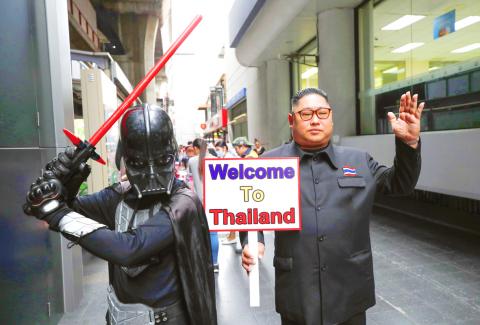The administration of US President Donald Trump has stepped up efforts to contain China’s rise, warning Asia’s leaders against taking its cash and using its equipment for 5G networks, but when it comes to the region’s biggest summit, the US is happy to let Beijing take center stage.
Trump plans to skip the East Asia Summit for the third straight year and this time he is not even sending US Vice President Mike Pence or US Secretary of State Michael Pompeo to replace him.
Instead, the US is to have its lowest-level representation at the meeting since then-US president Barack Obama joined the group in 2011, with new US National Security Adviser Robert O’Brien leading the delegation to Bangkok.

Photo: EPA-EFE
“We accommodated China’s rise, in the hope that they would become more free. In response, the CCP [Chinese Communist Party] took advantage of our goodwill,” Pomepo tweeted late on Wednesday. “Now, @realDonaldTrump is facing the reality of CCP hostility to the US and our values. We must engage China as it is, not as we wish it to be.”
Beijing plans to send Chinese Premier Li Keqiang (李克強) — Chinese President Xi Jinping’s (習近平) No. 2 — as it does every year.
While the summits often achieve little in terms of substantive outcomes, they remain one of the few places where leaders can openly discuss thorny issues ranging from trade to terrorism and territorial disputes in the South China Sea.
“In a region where just showing up has huge symbolism, the absence of Trump and Pence will no doubt raise renewed questions about how important Asia is in the US’ priorities,” Center for Strategic and International Studies senior associate Murray Hiebert said. “For the top echelons of the US foreign policy establishment not to show up would appear to hand China another opportunity to show that the US is distracted.”
Among the 40 agreements that are to be signed in Bangkok, the biggest one is not to include the US.
China, India, South Korea, Japan, Australia, New Zealand and the 10 ASEAN members are close to a breakthrough on the Regional Comprehensive Economic Partnership, which would reduce tariffs in an area representing about one-third of the world’s economy.

Taiwan yesterday denied Chinese allegations that its military was behind a cyberattack on a technology company in Guangzhou, after city authorities issued warrants for 20 suspects. The Guangzhou Municipal Public Security Bureau earlier yesterday issued warrants for 20 people it identified as members of the Information, Communications and Electronic Force Command (ICEFCOM). The bureau alleged they were behind a May 20 cyberattack targeting the backend system of a self-service facility at the company. “ICEFCOM, under Taiwan’s ruling Democratic Progressive Party, directed the illegal attack,” the warrant says. The bureau placed a bounty of 10,000 yuan (US$1,392) on each of the 20 people named in

The High Court yesterday found a New Taipei City woman guilty of charges related to helping Beijing secure surrender agreements from military service members. Lee Huei-hsin (李慧馨) was sentenced to six years and eight months in prison for breaching the National Security Act (國家安全法), making illegal compacts with government employees and bribery, the court said. The verdict is final. Lee, the manager of a temple in the city’s Lujhou District (蘆洲), was accused of arranging for eight service members to make surrender pledges to the Chinese People’s Liberation Army in exchange for money, the court said. The pledges, which required them to provide identification

Nine retired generals from Taiwan, Japan and the US have been invited to participate in a tabletop exercise hosted by the Taipei School of Economics and Political Science Foundation tomorrow and Wednesday that simulates a potential Chinese invasion of Taiwan in 2030, the foundation said yesterday. The five retired Taiwanese generals would include retired admiral Lee Hsi-min (李喜明), joined by retired US Navy admiral Michael Mullen and former chief of staff of the Japan Self-Defense Forces general Shigeru Iwasaki, it said. The simulation aims to offer strategic insights into regional security and peace in the Taiwan Strait, it added. Foundation chair Huang Huang-hsiung

’DISTORTION’: Beijing’s assertion that the US agreed with its position on Taiwan is a recurring tactic it uses to falsely reinforce its sovereignty claims, MOFA said The Ministry of Foreign Affairs (MOFA) yesterday said Chinese state media deliberately distorted Taiwan’s sovereign status, following reports that US President Donald Trump agreed to uphold the “one China” policy in a phone call with Chinese President Xi Jinping (習近平). During the more than one-hour-long call, Xi urged Trump to retreat from trade measures that roiled the global economy and cautioned him against threatening steps on Taiwan, a Chinese government summary of the call said. China’s official Xinhua news agency quoted Xi as saying that the US should handle the Taiwan issue cautiously and avoid the two countries being drawn into dangerous